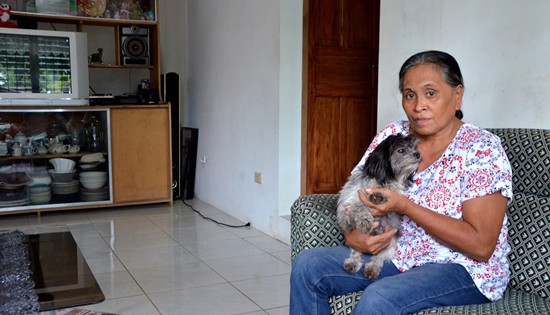
The
house the Nerios built through the years.
(Jose Alsmith L.
Soria) |
The widow
By
JOHN COLASITO
May 23, 2019
TACLOBAN CITY –
Aquilina Bronio was in her second year college taking up Civil
Engineering course when she married Bonifacio Nerio, a high school
classmate and neighbor in Barangay Tejero in Hilongos, Leyte. Both
came from farming families.
To survive, they worked as
rice tenants in three landholdings in their village with a combined
area of four hectares owned by three different landowners. Through
the intervention of the Department of Agrarian Reform (DAR), the
couple entered leasehold agreements with the said landowners,
thereby increasing their share.
“It was advantageous to
us,” Aquilina said. “Especially when we were already starting to
have children,” she added. Aquilina remembers the difficulty of
making both ends meet.
The couple averages 350
cavans of rice during harvest time. “52 cavans go to the three
landowners as rentals (for the four hectares ricefields)”, Aquilina
shared.
But, she explained, “the
remaining harvests left to us were not enough to meet our growing
needs”. According to her, “we had to find other ways to increase our
income”.
So, they raised ducks in
the 1980s. They let the ducks produce eggs which they sold for
additional income. They also made “balut”. The full-grown duck, the
eggs, and the balut, all these they sold not only in Hilongos, but
they went to other towns, even as far as the eastern side of Leyte
province just to make profit.
In 2010, Aquilina
considered themselves lucky for her husband was included among the
recipients of certificates of land ownership award (CLOAs) issued by
DAR. She added, their CLOA covered a .25 hectare cocoland previously
owned by the Vega family. “We were so happy because we can proudly
say, this land is ours,” Aquilina reminisced.
It was a big help to us,
said Aquilina, for they need not give share to anybody. “The profit
was all ours,” she added.
Meanwhile, for the
ricefields, Aquilina further disclosed, the problem they always
encountered was in renting farm equipment. According to her, they
always had to compete with other farmers in renting tractor during
land preparation, and thresher during harvest time which was on a
first come, first serve basis. Most of the time, we are accommodated
last by the owner of the machines, Aquilina said.
“So, we borrowed money to
buy a hand tractor first,” she narrated. It costed P105,000.
According to her, “we paid our lender during harvest. When we
fully-paid our lender, we renewed our loan to purchase two
threshers, amounting to P46,000 per unit, on separate occasions. We
had to impose financial discipline.”
Having acquired these
machines helped us make work faster and freed us from equipment
rentals, she quipped. Instead, we earned additional income by
offering the tractor and the threshers for rent, Aquilina added.
They earn P150 per hour
from tractor rental, while they get five cavans of rice for every
100 cavans of threshed rice for the use of their threshers.
According to Aquilina, they earn an average net income of P30,000
from thresher rental alone every harvest season when the cavans of
rice paid to them are sold.
From then on, life for
them became lighter and blissful. They got rid from loans, and
started to save part of their income.
With hard work,
perseverance and discipline, the couple was able to construct slowly
through the years a concrete house, far from their previous house
that was made only of light materials. They were also able to send
their four children to school. Three of them are now employed.
But as the song of Barbara
Streisand goes, “some good things never last,” Bonifacio suffered
cardiac arrest in 2014, leaving Aquilina a widow.
Everything left by her
husband, were products of the couple’s hard work and collaboration.
“As his wife,” Aquilina said, “I need to help my husband for us to
survive life’s challenges”.
Aside from continuing what
she and her husband had established throughout their married life,
Aquilina, now 62 years old, is active as the secretary of the Tejero
Riceland Cultivators Association since 2015.
She is accompanied at home
by her third child Criselda Grace who is employed at the Municipal
Agriculturist’s Office in their town.
Not all recipients of the
government’s agrarian reform program in their area had reached what
the couple had achieved. To Aquilina, it was because she and her
husband had no vices, and that they value every single cent they
earned. Their story was a testament of love and hard work.